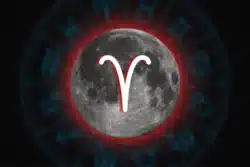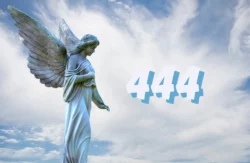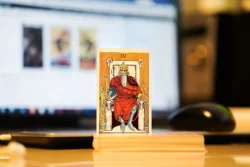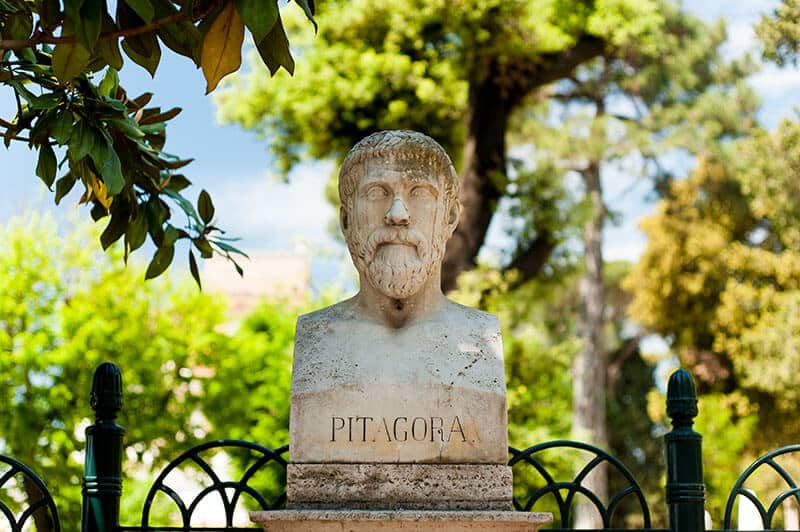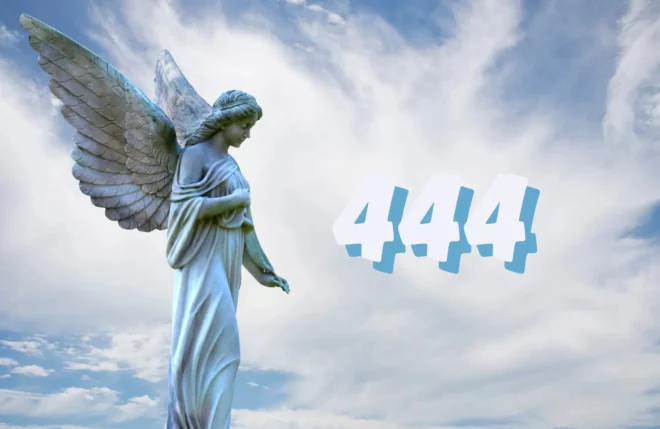Pythagoras of Samos, the renowned Greek philosopher, is usually hailed as the Father of Numerology. Many believe the core concepts of numerology began with Pythagoras. Is this actually true? Did Pythagoras really invent Numerology? Let’s explore this fascinating topic. What you THINK you know may not be 100% true.
Is Pythagoras the Father of Numerology?
When studying history, it’s always important to first establish a timeline. The exact dates that Pythagoras lived are still a bit controversial, although they don’t vary by too much. Some historians say he lived 582-507 B.C. while other historians believe he lived slightly later, 570 B.C. – 475 B.C. for example. In any case, he lived during the “Ancient Greece” era and was born in the first half of the 6th century B.C. It is generally agreed that he lived a very long life for the time, at least into his seventies.
If you really dig into ancient history, you’ll soon realize that the answer to the question of who developed Numerology is actually rather complicated, even though it is usually assumed by psychics and others who practice Numerology today that Pythagoras did so. This is what is written in many books and papers. The truth is more likely that it was actually an amazing group effort and we’ll explore this in more detail below.
Pythagoras Had Many Influential Teachers Who Paved the Way For Western Numerology
Pythagoras is usually billed as a “Greek” philosopher/mathematician but this is actually incorrect. His father and mother resided on Samos, a Greek Island, but his father was actually Phoenician. Some historians believe his mother may also have been of this heritage. At any rate, Pythagoras’ ties to the Phoenicians are an important factor in how well educated he was and the opportunities he had to study with not only great sages in Greece but also with sages in all the great civilizations of the time.
To understand Pythagoras’ opportunities, you must first have a crash course in the Phoenicians. They were a great seafaring civilization, and without any doubt, the Ancient World’s most successful merchants and long-distance traders. They built thriving city-states in the Levant region of the eastern Mediterranean, along the coast of what is now the southern Syrian coast, the Lebanese coast, and the northern coast of Israel. In part because of their superior shipbuilding talents, they also had permanent outposts in faraway places including Greece, Spain, Northern Africa, Sardinia, and other Mediterranean ports. In all of these outposts, there were known to assimilate peacefully, adapting to the culture of the area but also bringing improvements. They were well-liked and highly respected by all of the major civilizations.
As a Phoenician merchant, trading mostly in precious gemstones, Pythagoras’ father was wealthy. He also had many connections with the most powerful and influential people of the time. This is key to understanding how Pythagoras had so many opportunities to study with the best minds. It’s also key to understanding why he was not limited to studying with sages in Greece only.
At this time in history, knowledge was a highly guarded commodity. There were many secrets and much of the knowledge of the day was shrouded in mystery. Great knowledge was only shared with certain people and these opportunities were rather rare. The great civilizations of the day did not freely share knowledge with each other. However, the Phoenicians were often the exception to this as they had many warm and trusted relationships with all of the great civilizations in their trading routes. This was a huge advantage for Pythagoras and it’s also pertinent to how he came to appreciate the power of numbers from multiple cultural perspectives. It’s the key to how he helped develop the principles of Numerology, which eventually became the foundation for Western Civilization and thought.
Next after this publicity
Pythagoras did start out with teachers in Greece…. the best of the best in fact! He had private tutelage with Themistoclea, the High Priestess of the Greek Temple Delphi. She was considered one of the best sources for Ancient Greek knowledge and the supernatural. She taught Pythagoras a smattering of many subjects including mathematics, agriculture, astronomy, medicine, and what was known at the time about the natural world on Earth. While in Greece, he also studied under Thales of Miletus, who was considered one of the “Seven Sages of Greece.” He was so ahead of his time that he experimented with electricity and built a simple telescope — remember, this was in ANCIENT HISTORY, long before the Middle Ages, let along the Renaissance and the Modern Era! Thales of Miletus had studied for many years in Egypt and Babylonia and suggested that Pythagoras do so too. As it turns out, Thales of Miletus was also of Phoenician descent which is likely why he had these opportunities and how he helped Pythagoras have them too. Again… it’s the PHOENICIAN connection that comes into play.
Pythagoras went on to study for many years with the High Egyptian priests with whom the Phoenicians had warm and friendly trading relationships. They entrusted Pythagoras with some of their most trusted mathematical secrets and even allowed him to participate in their religious rituals, which was almost unheard of for that time. They indoctrinated him into their secret societies as well. Pythagoras studied mythology, history, and mathematics with the Babylonians, the Phoenicians, and the highest Hebrew Rabbis of the day. He was even admitted to the Ancient Mysteries’ of the Phoenicians which allowed him to study with the Phoenician Kings in the great temples in Tyre, Byblos, and Sidon. Pythagoras studied astronomy with the Chaldeans who were very advanced in this area and who believed that all the planets were dictated by numbers and vibrations and they played “music” as they moved and spun. He even studied religion with the Persian Magians where he learned the concept of reincarnation and other spiritual ideas like the soul being housed in the brain rather than the heart. This surely influenced his views on Numerology and the connection it can provide across time and space.
So, Pythagoras got his initial ideas about “Numerology” from far-flung sources that were never revealed to the vast majority of people who lived when Pythagoras lived. In fact, even when people were lucky enough to gain access to this type of highly guarded secret knowledge, it was usually restricted to one major source, i.e. the knowledge stored by only one culture. Pythagoras’ education was highly unique for the time and these doors seemed to have been opened to him in large part because of his Phoenician connections.
The Pythagorean School & the Pythagorean Brotherhood
Pythagoras eventually came home to Samos and started a school which taught many subjects but was focused on numbers and what could be called a form of Numerology. For a while, some of the greatest minds of the world came to Samos to study with Pythagoras. It should be noted this included a large number of women, which was usual for the time. However, eventually, a tyrant named Polycrates rose to power on Samos and made it difficult for Pythagoras to operate his school, especially since he was a free thinker and a pacifist.
Around 530 B.C., Pythagoras moved to the Greek-speaking southern Italian city of Croton. He started another school, purportedly called the “Semi Circle” but this is debated. This may have been a nickname for the school. At any rate, it became one of the most famous schools in history. It had a profound effect on the entire area, moving people from a lifestyle of corruption to a more simple, pure, and meaningful life. However, most of the teachings of the school were kept very secret and it became more like a secret society based on religion and science. If a student disclosed a secret, he or she could be put to death. In fact, it is thought that one student was thrown overboard at sea because he publicly disclosed what they had discovered about irrational numbers.
Entry into the school was very difficult and the rules once admitted were strict. For example, students had to take a vow of silence and were not allowed to write anything down because this would make it easier for the secrets to being discovered. Students were also required to be vegetarians and not eat beans. Only the top minds were accepted, and Numerology played a part in who was accepted. Those with a certain life score of 7 were more freely admitted than those without a 7. These students were put through a rigorous test, including psychoanalysis of sorts to ensure they could accept criticism and were able to think rationally and profoundly.
The secret society that stemmed from this became known in some circles as the Pythagorean Brotherhood and the students and followers became known as the Pythagoreans. Because the curriculum and findings were kept so secret, it was difficult to know what ideas were generated from Pythagoras himself or by his students or by both. It is now believed by many historians that the development of Numerology, or more specifically “Western Numerology,” was a group effort involving Pythagoras and many of his students. However, it’s also believed that not every student got to participate in this because this was one of the most closely guarded secrets at the time that Pythagoras was alive.
Pythagoras’ Wide-Scale and Enduring Influence
Before we go any further, it is important to emphasize the PROFOUND influence that Pythagoras had, and continues to have, on the world at large. Above all else, he was a legendary and inspirational teacher who had much wisdom to impart. Regardless of who exactly came up with the tenants used in Western Numerology, it was Pythagoras who was the most influential in passing it on to the world at large, even though it was so secretive at the time. This includes the continued work of his students and a whole family tree of students that came from those students after Pythagoras died. In fact, Pythagoras was probably the most influential force in the education and thinking of other great philosophers such as Pluto and Aristotle, even though they were born long after Pythagoras died.
A Telling Story About Pythagoras & Numerology
Before the telling of this story, it is important to understand that Pythagoras believed that all knowledge and wisdom in the universe were divined from numbers. This was a STRONG belief, to the point of it almost being a religion. When Pythagoras lived, the intellectuals of the time, the keepers of knowledge, who would be the equivalent of our most revered professors now, were called sages. The word “sage” literally means “to know.” However, it is said that Pythagoras would not accept this term for himself, even after years of intense study with the world’s greatest sages, and even though he excelled as a student and later as one of the world’s most influential teachers.
Pythagoras believed there was always more to learn and that the quest for wisdom should never end. So, instead of allowing himself to be called a “sage,” he invented a new word, “PHILOSOPHY,” which literally translates as the love of wisdom. This is why Pythagoras and his devoted followers, both before his death and after, became known as PHILOSOPHERS, not sages. This is also why Pythagoras is sometimes called the “Father of Philosophy” in addition to the “Father of Numerology.”
Next after this publicity
All of Pythagoras’ followers’ primary pursuits were based on principles of Numerology. These included music and astronomy/astrology where they talked about the importance of vibrations and seemed to understand different energy levels. Even today, most Numerologists view their role more as ongoing seekers of knowledge and wisdom, rather than a static repository of knowledge. They believe the Universe always has more to teach them — and this way of thinking started with Pythagoras. It was a major paradigm shift in the history of how academic pursuits developed…. philosophers, not sages. It gave “philosophers” more freedom to branch out into many more disciplines. The development of “natural philosophy,” which became natural history and natural science, like that practiced by Aristotle, grew out of this for example.
Pythagoras’ Connection To J.K. Rowling’s Wizarding World
Hermione Granger, one of Harry Potter’s closest friends, is portrayed as being really into “arithmancy” which is described as a study of the magical properties of numbers. In J.K. Rowling’s books, Hermione even learned to make predictions by studying complicated number charts. Pythagoras is credited with developing the field of arithmancy and advocating for its advancement in his secret schools. The “mystical” properties of numbers were attributed to the vibrations of the numbers by Pythagoras and his followers. It may not be a coincidence that Hermione Jean Granger’s Life Path Numbers is a 9. It would be an interesting question to ask J.K. Rowling. Was this intentional?
So, What’s the Bottomline? Did Pythagoras Invent Numerology?
Getting back to our original question of whether or not Pythagoras is the true Father of Numerology if you accept that title for Pythagoras, it’s best to think of it in a broad sense. Pythagoras was certainly one of the greatest teachers that ever lived. He also seized fully the opportunity he was given as a younger man to learn from all he could from all of the great cultures and civilizations of his time. In other words, he was not limited to the knowledge base and beliefs of only one culture and this made him really unique.
Pythagoras seemed to have an uncanny ability to synthesize all that knowledge, wisdom, and insight he gleaned from all the major cultures into a coherent and unique way of viewing the world… and it was NUMBERS that Pythagoras held dearest. He seemed to use NUMBERS to glue all the varied wisdom together and he put an almost religious faith in NUMBERS when divining the secrets of the universe. So, in this sense, he could be called the Father of Numerology.
Pythagoras obviously had enormous influence, perhaps even greater than the likes of Aristotle, who was also heavily influenced by Pythagoras. In a way, Pythagoras embedded Numerology in the fabric of all academic pursuits that followed him. The lasting influences of this are hiding there in plain sight. However, these influences are only fully recognized by those fortunate enough to study Numerology as a separate discipline and believe in its power.
To sum up, Pythagoras can be viewed as the Father of Numerology, not because he invented the idea/discipline, but because he created an entire movement which developed the concept of Numerology. And… his movement had staying power!
Final Thoughts
If you have a keen interest in Numerology, it will behoove you to learn as much as you possibly can about Pythagoras. A deep dive into his primary teachers and what ideas they filled his mind with would be one place to start. You could also learn more about the secretive Pythagorean Brotherhood (The Pythagoreans) and what his followers later developed after Pythagoras’ death. All of this will give you a much deeper understanding of the origins and development of Numerology and how to interpret and glean the most from Numerology Charts today.
Learning more about Plato and Aristotle’s works (and their students/colleagues) would also be helpful in really getting the most out of Numerology. These great philosophers were heavily influenced by the teachings of Pythagoras, who in turn, laid the foundation for Western thought. Pythagoras also shows up in some rather surprising ways, sometimes hidden but then rediscovered. For example, it is now thought that an almost lost and rare set of manuscripts from Pythagoras was bought by Plato. Centuries later, these manuscripts and their derivative works laid the groundwork for the origins of Freemasonry. So, you can say that the Masons are grounded in Numerology too, even if they don’t realize it.
Next after this publicity


















